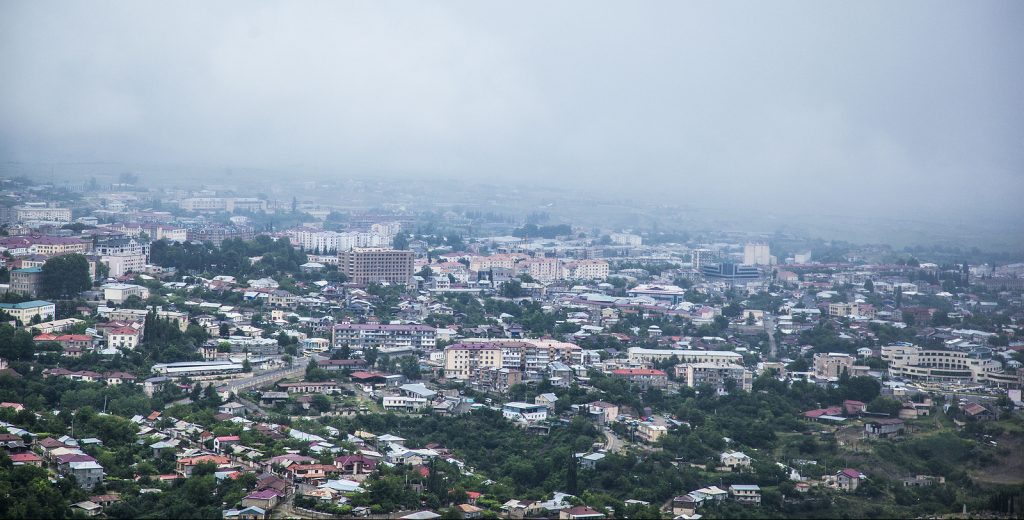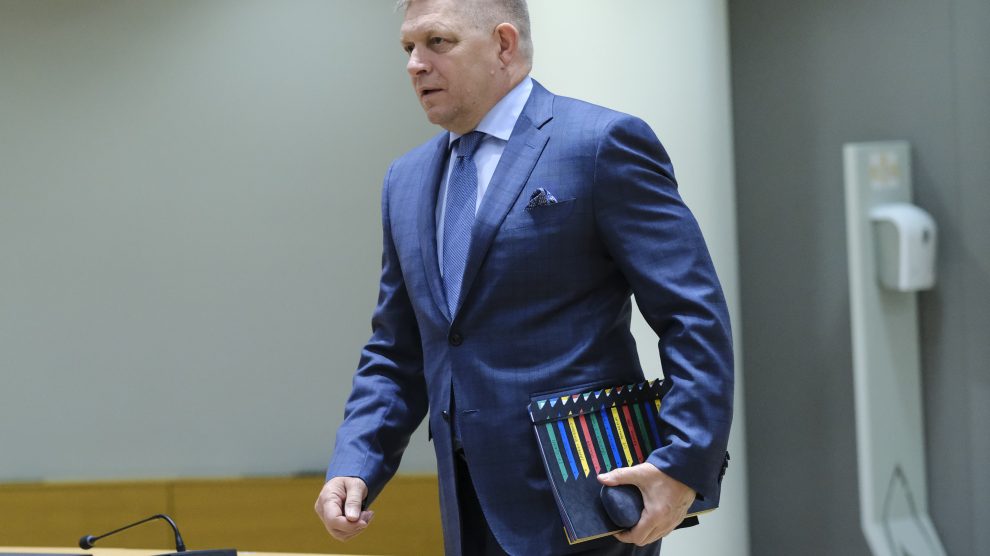Catch up quickly with the stories from Central and Eastern Europe that matter.
Russia’s war on Ukraine
Slovakia’s new prime minister, Robert Fico (pictured), announced on Thursday that he would stop delivering arms to Ukraine, limiting support for his neighbour to “humanitarian and civilian aid“.
Slovakia has until now been a staunch supporter of Kyiv since Russia invaded in February last year, donating arms and opening its borders for refugees fleeing the war.
But the day after Fico’s appointment as head of a coalition government that includes a pro-Russian far-right party, he announced, “We see aid to Ukraine solely as humanitarian and civilian aid, and we will no longer supply Ukraine with arms.”
“An immediate halt to military operations is the best solution for Ukraine,” he said. “The EU should move from being an arms supplier to a peacemaker.”
Russia will not participate in the Ukrainian-backed peace talks to be held this weekend in Malta and warned any discussions without its participation would be counterproductive.
The talks, which Ukrainian president Volodymyr Zelensky hopes will drum up support for his own 10-point peace plan calling for the full withdrawal of Russian troops from Ukraine’s internationally-recognised borders, come after similar gatherings in Jeddah and Copenhagen earlier this year.
“We think that compared to Copenhagen and Jeddah, when there were 15 countries in Copenhagen and 43 in Jeddah, there will be more than 50 countries,” said Igor Zhovkva, a senior aide to Zelensky. Security advisors from Turkey, France, Germany, the United States, and South Africa will be among attendees.
Ukraine says it continues to fend off attempts by Russian forces to encircle Avdiivka in Donetsk oblast—which Russia claims to have annexed last year.
“In the Avdiivka direction, the enemy does not stop trying to encircle Avdiivka, actively uses aviation, but our soldiers are firmly holding the defence and inflicting significant losses on the enemy,” said Andriy Kovaliov, a spokesperson for the general staff of the armed forces of Ukraine.
The spokesperson claimed that in the last 24 hours Ukraine’s air force had launched seven strikes on enemy manpower clusters. He claimed that missiles hit three enemy ammunition depots, six artillery units and one air defence radar station. He also stated that offensive operations have continued in the Melitopol sector, which he said had weakened the enemy along the entire frontline there.
Russia is “massively” recruiting Cuban mercenaries to fight in its war against Ukraine, according to Kyiv’s special forces.
Ukraine’s National Resistance Center, which was set up by the country’s special forces, said a cyber group hacked the emails of a Russian military official and discovered almost 200 Cubans had been recruited.
The Cuban fighters are reported to be fighting around Bakhmut and Kupiansk and are scattered among existing Russian units.

Mist hangs over Nagorno-Karabakh’s now largely deserted capital of Stepanakert (Khankendi in Azeri)
Other news from the region
Despite Baku’s recent military operation to retake Nagorno-Karabakh and the subsequent displacement of the region’s 120,000 Armenian residents, Armenian PM Nikol Pashinyan said on Thursday at a conference in Tbilisi, Georgia, that his government could sign “an agreement on peace and the establishment of relationships” with Azerbaijan “in the coming months.” He also said that Armenia sees no advantage in continuing to host Russian military bases on its territory.
Poland’s president, Andrzej Duda, will not convene a new parliament until nearly a month after a three-way opposition alliance won an overall majority, which could delay the installation of a new government until well into December. The ruling Law and Justice party (PiS) finished first in the 15 October ballot but has no viable path to government, while the opposition coalition, led by Donald Tusk, a former PM and European Council president, this week confirmed its majority and said it was ready to take office.
Hungarian Prime Minister Viktor Orbán kicked off his campaign for next year’s European parliamentary elections with criticism of the bloc’s leaders on Monday, calling Brussels a “bad contemporary parody” that he said can still be fixed. Hours after he spoke, thousands rallied in Hungary’s capital Budapest, a liberal stronghold that has largely opposed Orbán’s agenda. Some voiced fears that Hungary might end up leaving the EU under his rule, a prospect Orbán has repeatedly dismissed.
North Macedonia will seek compensation from Bulgaria over the recent introduction of a fee on the transit of Russian gas through Bulgarian territory. Skopje, which is without its own gas deposits and depends upon gas imports via Bulgaria, will also bring a complaint before the European Union against the new fee. Earlier in October, Bulgaria introduced a fee of 20 leva (10.22 euros) per MWh on Russian natural gas transiting its territory.
Kosovo’s PM, Albin Kurti, met Serbian president Aleksandar Vučić on the sidelines of Thursday’s EU summit in Brussels to discuss the implementation of a normalisation agreement reached by the two leaders in February, prior to the recent escalation of tensions. While the EU and US are pressuring Kurti to create an Association of Serb-Majority Municipalities in northern Kosovo, he remains concerned it would pave the way for a Serb mini-state.
Despite Baku’s recent military operation to retake Karabakh and the subsequent displacement of the region’s 120,000 Armenian residents, Armenian PM Nikol Pashinyan met with his Azerbaijani counterpart on Thursday and said that his government could sign “an agreement on peace and the establishment of relationships” with Azerbaijan “in the coming months.” He also said that Armenia sees no advantage in continuing to host Russian military bases on its territory.
Slovenia officially introduced border checks with neighbouring Hungary and Croatia on October 21 following a similar move made by Italy due to an upsurge of violence in the Middle East and an influx of migrants from Serbia into Hungary. The Slovenian government has said the checks should last for at least 10 days. Schengen nations can temporarily reintroduce border controls “in the event of a serious threat to public policy or internal security.”
Latvian president Edgars Rinkēvičs told a Latvian broadcaster this week that NATO should close the Baltic Sea to ships if Russia is found responsible for damaging the undersea Baltic connector gas pipeline, prompting fury from the Kremlin. However, on Tuesday, Finnish investigators said they believed an anchor of a Chinese container ship was dislodged and caused the damage to the pipeline between Finland and Estonia on the Baltic Sea earlier this month.
Vinted is weighing a secondary share sale that could be worth more than 200 million euros as Europe’s biggest online marketplace for used clothes seeks to be at the forefront of a sustainable fashion boom. The lossmaking Lithuanian start-up, valued in May 2021 at 3.5 billion euros, is working with Morgan Stanley to consider options for its capital structure ahead of a potential initial public offering, people familiar with the matter said this week.
Main photo: Slovakia’s new PM Robert Fico arrives at a meeting of the European Council on October 26. © European Union.
Unlike many news and information platforms, Emerging Europe is free to read, and always will be. There is no paywall here. We are independent, not affiliated with nor representing any political party or business organisation. We want the very best for emerging Europe, nothing more, nothing less. Your support will help us continue to spread the word about this amazing region.
You can contribute here. Thank you.


